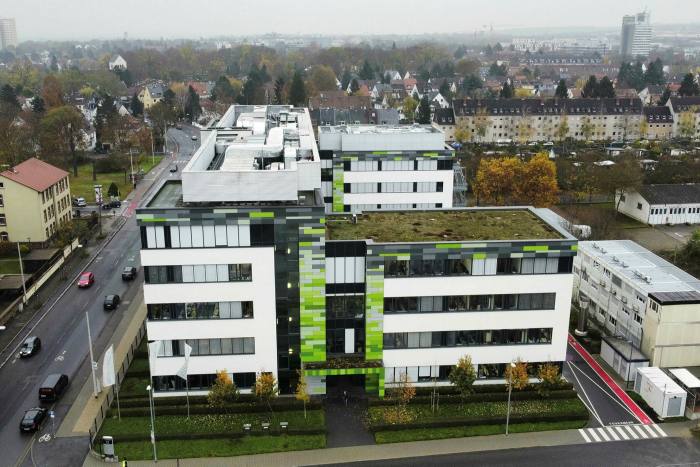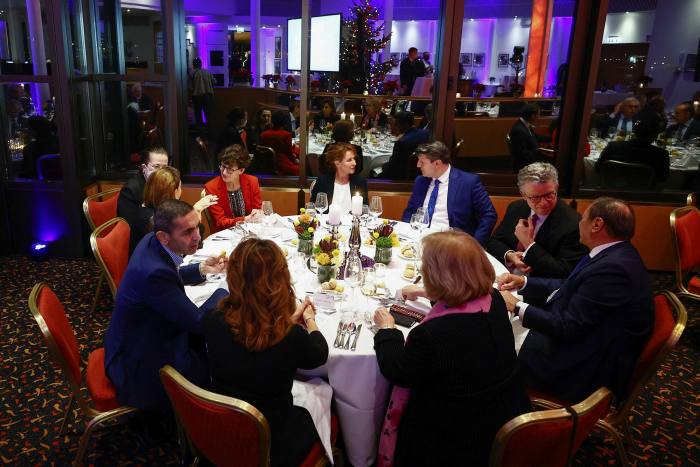German city reaps tax windfall from BioNTech’s Covid vaccine success
As residents of Mainz gathered in late November for their first festive glass of mulled wine in Schillerplatz, the medieval heart of the German city, officials in the nearby City Hall realised they had even more cause for Christmas cheer.
The former Roman stronghold on the banks of the Rhine had become the beneficiary of a billion-euro tax windfall, largely thanks to BioNTech, the Covid-19 vaccine developer founded in the city in 2008.
“During the pandemic, Mainz became the world’s pharmacy,” said mayor Michael Ebling, who pledged to use the funds flowing from BioNTech’s pivotal role in fighting coronavirus to clear the city’s debts.
Corporation taxes — some of which can be set by local German authorities — will also be cut in a bid to attract more biotechnology businesses.
More than 2bn doses of the BioNTech/Pfizer vaccine have been delivered to date, and BioNTech is on track to post more than €10bn in net profit for 2021. For the nine months to the end of September, the company, which has sites in the US and other German cities such as Marburg, paid more than €3bn in taxes.
Officials would not publicly confirm how much tax BioNTech paid to Mainz in the past few months. But the company, unknown even to many of the city’s 220,000 inhabitants before the pandemic, has almost single-handedly lifted Mainz’s corporation tax haul from €173m for 2020 to more than €1bn in 2021, according to several people with knowledge of the matter.

Having achieved global fame for Gutenberg’s 15th-century printing press, Mainz has long since been the poor relation to neighbouring Frankfurt, Germany’s financial centre. But unlike Sindelfingen, a south-west German city that is home to a Mercedes-Benz plant and which used recent tax windfalls to install marble zebra crossings, Mainz is not going on a spending spree.
“Our highest priority is to clear our cash debt [short-term loans] of €634m by the end of 2022,” finance director Günter Beck told the Financial Times. “There is a broad political consensus for this move because until the debt is paid, we have no freedom to decide on discretionary spending.”
Indebted German cities in receipt of these loans can only spend money on “unavoidable” projects.
The state of Rhineland-Palatinate, of which Mainz is the capital, had the highest per capita level of short-term debt in 2020, according to figures from the Bundesbank. The city itself has been enrolled in a debt relief programme for almost a decade.
Now, Mainz will have a surplus of almost €1.1bn in 2021, and authorities expect a further surplus of more than €490m next year.
Once its short-term debts are paid, Ebling, of the Social Democrats, aims to leverage the city’s good fortune to reduce its reliance on a single company.
“We will now use our positive financial position and budget surpluses to establish a global science and biotechnology hub,” he said, promising to accelerate the transformation of a 12-hectare former barracks near BioNTech’s headquarters into a business and cultural centre. About 5,000 jobs would be created in the process, the mayor added.
There should be no shortage of tenants. Thanks to BioNTech, companies from across Germany and beyond have inquired about a move to the city, according to officials.
“Suddenly, we are well known in Singapore,” said Günter Jertz, chief executive of the chamber of commerce for the Rheinhessen region, which includes Mainz. For a city that used to make headlines only for its annual carnival, BioNTech’s scientific and commercial success, he added, “is priceless advertising”.
Mainz is also rolling out the red carpet. Flush with cash, the city will next year lower its corporation tax by almost a third, a measure that will save companies more than €350m in 2022, according to the mayor.
The reduced rate brings Mainz in line with nearby Ingelheim — home to Germany’s second-largest pharmaceutical company, Boehringer Ingelheim — and makes the city a far cheaper place to do business than neighbouring Wiesbaden or Frankfurt, both in Hesse state.
The decision was taken “because we want to give something back to those who keep the economy going in Mainz”, said Beck.
Did he mean BioNTech, and did the vaccine developer demand a lower rate? “No,” Beck insisted, “naturally not.”
Mainz’s commercial centre, where occupancy rates have plummeted during the pandemic, needs more investment. The city is also short of housing and kindergarten places.
But few have criticised City Hall’s priorities. “It’s so important that we invest in the development of the business and biotech location,” said Peter Hähner, a banker and president of the Rheinhessen chambers of commerce. “The cycle paths [can] come after that.”
What is more, he said, there “could be a risk if we don’t support BioNTech, that they . . . go elsewhere”.
There are no signs that the company, which was spun out of Johannes Gutenberg University, where founders Ugur Sahin and Ozlem Tureci were conducting cancer research, will leave the city.

Last month, the company announced it would spend more than €1bn on expanding its headquarters, situated on “At the Goldmine,” a road named after a Roman archaeological find. It would also build 10 sites across Mainz and employ thousands more in the coming years, Sahin said.
Several companies in the region have also benefited from Covid vaccine sales, including Germany’s Merck, which is producing lipid nanoparticles for BioNTech/Pfizer, and suppliers such as vial maker Schott.
Beck, who represents the Green party, is confident such companies and newer arrivals will keep Mainz in the money. Even if that is at the expense of other, higher-taxing cities.
“There was an article [in the newspaper] saying that Wiesbaden is jealous, and that Mainz is not showing solidarity,” he said. “Well, Wiesbaden has been rich for decades and Mainz was poor. There was no solidarity from Wiesbaden to Mainz either.”
For all the latest Business News Click Here
For the latest news and updates, follow us on Google News.
